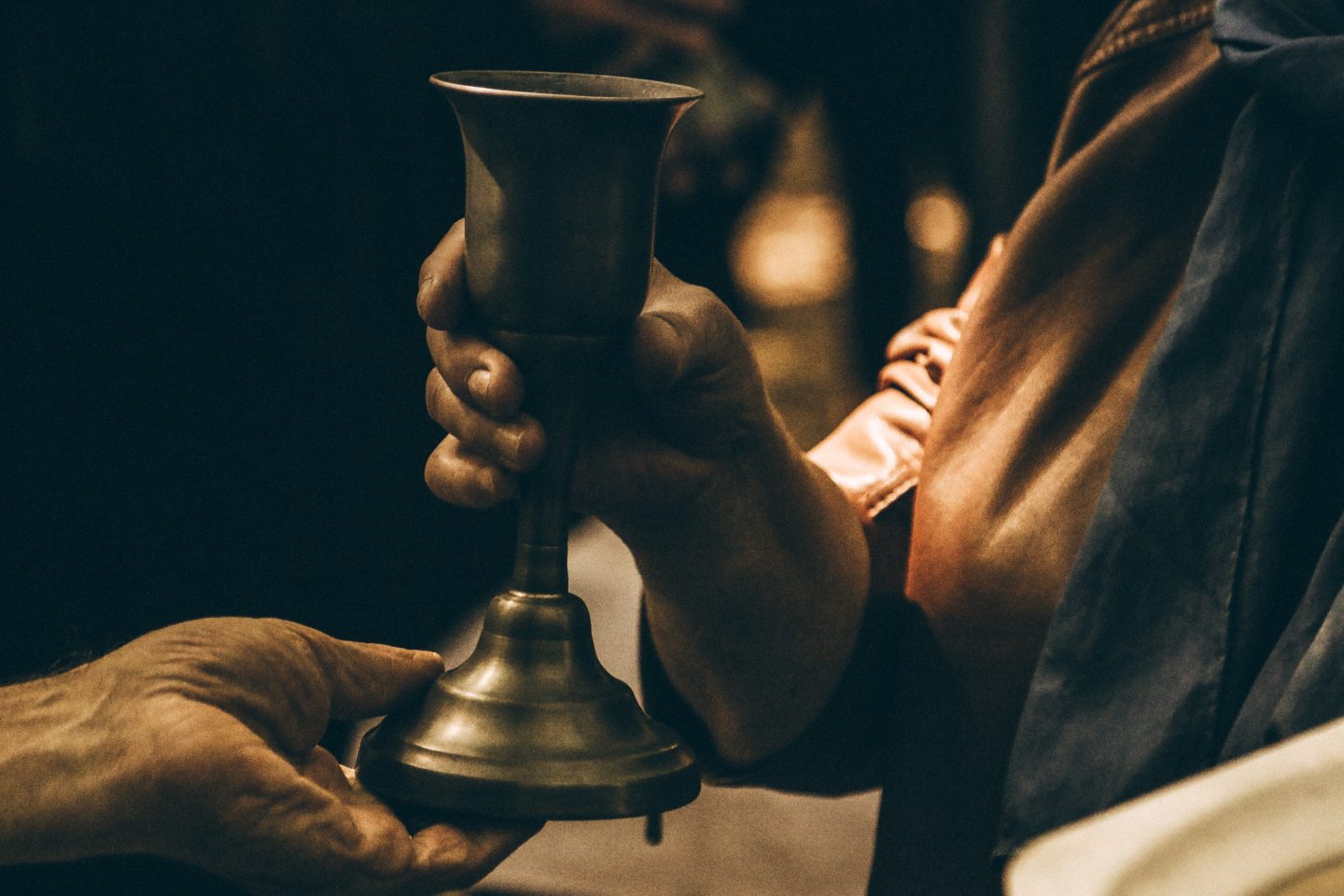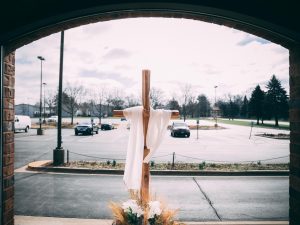Easter comes and leaves quickly, and in the midst of busy lives we often have limited space and time to process and reflect on the cross: on Jesus’ betrayal, death, burial, and resurrection. We invite you to journey with us this Easter in this devotional, taking you through four snapshots of the cross. Our prayer and hope is that you would experience Jesus and be encouraged that new life is really found through faith in him.
Thursday
Read Luke 22:3-23
Betrayal.
What comes to mind when you read that word?
The idea of betrayal can seep into our bones, sparking flickers of pain. We know the consequences of betrayal all too well: the disintegration of trust, sadness, a broken relationship… It’s like a punch in the gut.
Jesus has already entered Jerusalem to a hero’s welcome, with shouts of “Hosanna.” But amongst this crowd of onlookers, disciples, and the curious is Judas. He meets with the chief priests and elders to conspire. He knows they want Jesus to die, and that they want to arrest him quietly. When they inquire about Jesus’ whereabouts, Judas wants to know what’s in it for him. The chief priests and elders promise to award him money.
Judas agrees to betray his friend Jesus for monetary gain.
Sunset to sunrise, Judas continues to walk with Jesus. When the last supper comes on Thursday evening, Jesus reveals that one of his disciples will betray him. Jesus spends his last meal amongst friends and a betrayer.
The betrayal runs deep. However, in the midst of this and his impending death, Jesus’ love travels farther.
He reclines at the table and breaks bread, symbolizing his future broken body. He pours wine and shares it, symbolizing his future blood spilled to cover our sin. Jesus knows his death is near, and even tries to prepare his disciples. He claims, “I have earnestly desired to eat this Passover with you before I suffer.”
Jesus embraces the reality of his suffering. He stays on mission and reminds his followers of how they are to serve and minister to those around them. He even models for us how to pray for the people who hurt us (Matthew 5:44). Jesus also says, “Those who are well have no need of a physician… I have not come to call the righteous but sinners to repentance” (Luke 5:31-32). Jesus came to earth for people like Judas. He came to save the betrayers, abusers, and idolaters from their sin.
How does Jesus’ response and actions around his betrayal reveal his character? How do they point towards the cross? In response to this snapshot, what is God inviting you to do, or trust him with?

Friday
Read Matthew 27:24-56
Abandonment.
“About three in the afternoon, Jesus cried out, ‘Eli, Eli, lema sabachthani?’” (Matthew 27:46)
“My God, my God, why have you forsaken me?” Jesus asks.
He hangs nailed to a cross, crucified for a crime he didn’t commit. People rallied for this. They yearned for him to die like this. And now, Jesus, completely God and completely man, wants to know why God left and abandoned him.
It is difficult to quantify this amount of abandonment, however I once experienced abandonment from a friend in the middle of a busy season of school. It was my final year of university and I was also balancing serving in a leadership role in campus ministry. As eager as I was to serve the Lord, I had no idea how hard it would be to lose a critical friendship in the midst of it. In the busyness I struggled to find time to spend with God. This was a season that revealed deep worry and fear.
On some nights, I would wake up with pain in my chest. I couldn’t stop thinking about the situation and my heart felt like it was pumping so hard it could pop out of my chest. It was so scary, and in the middle of the night, I never felt more alone. Without anyone, even God, to help me.
I asked God, “Where are you?” I too felt like God had left me in the rubble.
Maybe you’re experiencing hardship too, negative thoughts, or have witnessed someone else suffer. Perhaps you even feel abandoned now.
In those moments when we feel utterly alone, or even abandoned by God, Jesus promises us that if we place our faith in him as Lord and Saviour, he will never turn away from us. Even at the end of all things, when we stand before God and he takes our lives into account before himself as the holy Judge, he will not reject us—but will welcome us into his eternal family.
How does this all work together? As Jesus felt the full weight of abandonment, as he who knew no sin was becoming sin for our sake, the rift between God and us was closed.
And not only did spiritual things happen in that moment, a few crazy things happened physically as well. Did you notice them in the story? Matthew 27:51-54 describes the scene: earthquakes, dead people coming back to life, and the soldier who was watching over Jesus proclaimed that Jesus was really the Son of God. When the earth shook, God was simply making the earth echo Jesus’ godliness. His claim to be the Son of God was confirmed.
But what may be even more significant was the curtain of the temple, the physical barrier between God and us, that was torn in two, from top to bottom.
When Jesus bore the full weight of our sin on himself, and when God looked away, allowing Jesus to die, the barrier between God and man was ripped apart.
No longer do we need to be separated from God by a curtain, or offer an “pure” animal as payment for our sin. Jesus was the final and permanent sacrifice. His death opened the door for us to enter God’s throne room to talk to him “face to face, as one speaks to a friend” (Exodus 33:11).
With confidence we can draw near to God and approach him freely: asking for mercy and help in times of need (Hebrews 4:16). Isn’t this amazing? The death of Christ has made it possible for us to find restoration of relationship and deep healing with our Creator.
Is there a time or moment that you have felt abandoned? How does God turning away from Jesus on the cross bring hope or healing in your relationship with him? In response to this snapshot, what is God inviting you to do, or trust him with?

Saturday
Read Luke 23:50-56
The day after.
Trickles of blood roll down his side. His body lays open, barren, and without a place to rest.
The crowds sweep into their homes, preparing for Sabbath. Mary mourns her son, the disciples grieve their beloved friend. Chief priests, seething, beg Pilate to station a guard outside of Jesus’ tomb.
No one will help him “rise from the dead.”
Saturday was a dark day.
…
I feel shocked as I see large purple splotches on Grandma’s legs. I tap my phone, searching for an answer.
Blood clots.
A couple weeks later the splotches disappear, but her “shortness of breath” begins.
In a sequence of days, too quick to linger on, Grandma is diagnosed with cancer. Radiation and chemo cripples her frail body; she resolves to fight with pills. First, she loses energy to walk down stairs. Then she loses her strength to hold a cup.
There’s grief in watching someone die. There’s prolonged grief as it lingers for weeks or months. I watched my grandma die over a period of time. The disciples experienced all of these emotions over a weekend; how shocking it must have been for them.
Even so we prayed every day for her to get better. Grandma gripped my hand. We thanked the Lord for each day we spent with her, and we cried at her bedside when those days finished.
As the disciple John grips Mary’s hand, he looks up at Jesus who asks him to look after his mother. Then Jesus declares, “It is finished,” and dies (John 19:26-30).
During the funeral, we shared stories of Grandma: babysitting us, helping us grow up, baking banana bread, and laughing. We longed for her presence: to hold her hand, to hear her voice, and to see her smile.
The finality of death stirs deep grief, often overwhelming us.
The disciples grieved for the man who calmed their fears when he calmed a storm, invited the marginalized into friendship, and offered a second chance of life to the outcast. They longed for the Son of the Most High King who called fisherman and tax collectors friends, who took empty vessels and filled them with wine, and who refused a crown to walk as a servant.
Humility, love, compassion, and kindness had broken bread with them, prayed with them, and taught them.
As my family faced our grief with the loss of my grandma, we knew she had travelled home to God in heaven. She got to go home because she believed in Jesus. We can have assurance because we know the end of Jesus’ story. He didn’t stay dead on that dark Saturday.
But the disciples didn’t yet realize that. All hope appeared lost. The finality of death hung over them. Yet behind the scenes, God was still very much at work, and very much in control. Jesus was breaking down the gates of death so that it wouldn’t have the final say. The battle seemed lost but the war was not yet over. In fact, his death was the last push towards victory. And we’ll get there—tomorrow.
But today we sit in what feels like darkness.
When have you felt in darkness, like all hope was lost? What brought you out of that place? A person, event, or comfort? In response to this snapshot, what is God inviting you to do, or trust him with?

Sunday
Read Luke 24:1-35
Risen.
“Why do you seek the living among the dead? He is not here, but he has risen.” (Luke 24:4-5)
How would you feel if someone you knew died and then came back to life? It’s insane to think about. I would probably start to doubt my perception of reality. But this is actually what happened.
At the beginning of Luke 24, God uses a handful of women visiting an empty tomb to receive confirmation from angels that Jesus rose from the dead. As grief consumed the disciples after Jesus’ death, they struggled to believe that Jesus really rose from the grave. The word seemed hollow, too good to be true.
But it wasn’t just for them. The resurrection has implications for us too.
When Jesus rose from the dead it was a public and loud event—God even sent an angel to declare it. Why did Jesus return so boldly, wanting his resurrection to be proclaimed to all peoples? Essentially, God the Father was pleased with the sacrifice of Jesus the Son. It was worth declaring and pointing glory back to God.
Jesus’ resurrection also proves that Jesus really did conquer death; no longer did it have power or a hold over him. This new resurrection life that Jesus has is also something we get through faith in him! We are granted new life, new hearts, and led into new behaviours and actions (Colossians 3:1-17).
Just as death didn’t hold Jesus, death will not hold us. Yes, at some point we will all die physically, but God promises one day to bring us back in a bodily resurrection, and we can live eternally with God in the new heavens and on a restored earth (1 Corinthians 15:51-57).
The power of Jesus’ resurrection also grants us confidence and assurance in our faith. It gave Jesus’ disciples boldness as they preached about Jesus (Acts 4:13-21). When Jesus rose from the dead and then ascended back into heaven, he also gave the gift of the Holy Spirit to all believers (John 16:7). The Holy Spirit gives us boldness and confidence too as we follow God, serve and love him, and share about Jesus to others.
…
On the Thursday evening, Jesus broke bread and shared it with this disciples, just like he offered up his life on Friday and gave it to us. His resurrection on Sunday grants us new eternal life found in placing our faith in him.
Jesus knows his disciples are processing his loss and are sitting in their grief. They walk home, defeated—believing that after three years of ministry, it was all over. Jesus meets them on that road and talks to them.
They share another meal.
Jesus breaks bread again—just like on the Thursday evening at the Last Supper. Their eyes are opened and they realize that it really is Jesus alive after all! All hope is not lost, and Jesus’ mission for them is yet to truly begin. So they return to Jerusalem and gather together.
Do you find it easy or hard to believe that Jesus rose from the dead? How does this “new life” impact you? In response to this snapshot, what is God inviting you to do, or trust him with?
This Easter, how is Jesus inviting you to find new life in him?
"*" indicates required fields
Share this!
About the Author

Alex R





